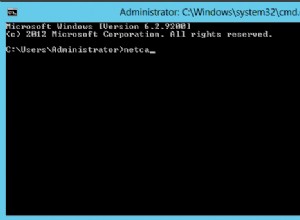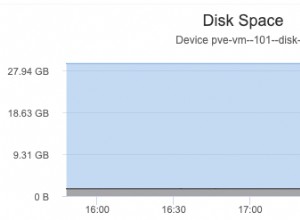Ho appena affrontato lo stesso problema e ora ho una soluzione. Fondamentalmente ci sono due problemi. Il primo è che Oracle richiede di dirgli il nome del tipo di array quando viene registrato il parametro di output. Il secondo è come convincere Groovy a lasciartelo fare. Fortunatamente, sembra che i designer di Groovy ci abbiano pensato e ti permettano di sottoclassare groovy.sql.Sql per agganciarti all'impostazione dei parametri.
Userò il tipo di esempio e la procedura memorizzata in questa risposta a una domanda simile a livello JDBC:
SQL> CREATE TYPE t_type AS OBJECT (val VARCHAR(4));
2 /
Type created
SQL> CREATE TYPE t_table AS TABLE OF t_type;
2 /
Type created
SQL> CREATE OR REPLACE PROCEDURE p_sql_type (p_out OUT t_table) IS
2 BEGIN
3 p_out := t_table(t_type('a'), t_type('b'));
4 END;
5 /
Procedure created
Ora abbiamo bisogno di un paio di nuove classi Groovy:
import groovy.sql.*
import java.sql.CallableStatement
import java.sql.PreparedStatement
import java.sql.SQLException
import oracle.jdbc.driver.*
class OracleArrayOutParameter implements OutParameter {
String typeName
int getType() {
OracleTypes.ARRAY
}
}
class OracleArrayAwareSql extends Sql {
OracleArrayAwareSql(Sql parent) {
super(parent)
}
void setObject(PreparedStatement statement, int i, Object value) throws SQLException {
if (value instanceof OracleArrayOutParameter) {
try {
OracleArrayOutParameter out = (OracleArrayOutParameter) value;
((CallableStatement) statement).registerOutParameter(i, out.getType(), out.typeName);
} catch (ClassCastException e) {
throw new SQLException("Cannot register out parameter.");
}
}
else {
super.setObject(statement, i, value)
}
}
}
L'uso di questi è piuttosto semplice. Probabilmente vorrai che la documentazione Oracle sugli array comprenda le strutture di dati risultanti.
// First create a "normal" groovysqlSql instance, using whatever method you like
def parent = Sql.newInstance("jdbc:oracle:thin:@host:port:sid", "user", "password", "oracle.jdbc.OracleDriver")
// Then create an OracleArrayAwareSql instance giving that parent instance as a parameter
def sql = new OracleArrayAwareSql(parent)
// Now define an OracleArrayOutParameter naming the array type
def tTableParam = new OracleArrayOutParameter(typeName: 'T_TABLE')
// And make a stored procedure call as usual
sql.call("{call p_sql_type(${tTableParam})}") { out ->
// The returned parameter is of type oracle.sql.ARRAY
out.array.each { struct ->
println struct.attributes
}
}




